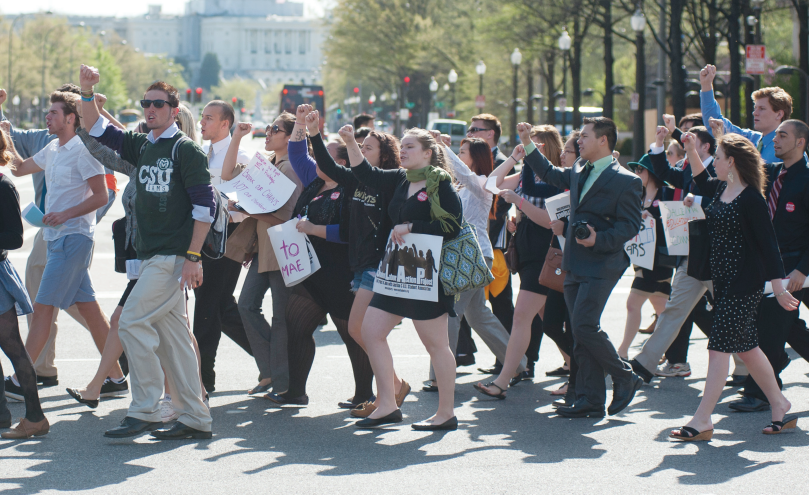Indiana Bill To Ban CRT Teaching Has Been Defeated
The Indiana Senate opted not to call forward House Bill 1134 for a second reading which effectively killed the bill. The bill in question was intended to restrict how teachers could teach about race and racism with a focus on critical race theory (CRT). The move, or lack thereof, signals that HB 1134 didn’t have the full Republican support necessary in the Indiana legislature that sees Republicans holding a supermajority in both chambers.

The Indiana Senate opted not to call forward House Bill 1134 for a second reading which effectively killed the bill. The bill in question was intended to restrict how teachers could teach about race and racism with a focus on critical race theory (CRT). The move, or lack thereof, signals that HB 1134 didn’t have the full Republican support necessary in the Indiana legislature that sees Republicans holding a supermajority in both chambers.
Monday was the deadline for the bill to garner its second reading. Senate sponsor Linda Rogers (R-Granger) declined to call forward the “divisive concepts” bill after Indiana lawmakers had twice delayed considering the bill. The bill, as presented now, was a watered-down version of its initial intention, but still didn’t gain the support necessary to move it forward.
Senate President Pro Tempore Rodric Bray (R-Martinsville) said after the vote the bill simply didn’t have enough support. There were some Republican lawmakers who felt the bill would encumber educators, while other lawmakers felt the bill, centered around CRT being taught in Indiana schools didn’t go far enough. Bray didn’t comment that while this particular bill didn’t move forward, lawmakers could possibly take parts of the bill and incorporate them into other legislation. Bray didn’t elaborate on which parts of the bill may move into other legislation, but he did say that HB 1134 would not pass piecemeal.
CRT in public schools has been a major topic, not just in Indiana, but in many states across the nation. Numerous bills have been written or are being written to stop the perceived critical race theory that is being taught in schools. Although Indiana’s HB 1134 passed the House in January, it had received a ton of vocal opposition from teachers across the state, Black education advocates, and even some school districts.
The original bill was asking for curriculum review committees that would have the power to veto any learning material in every school district. It was also set up to ban the teaching of eight concepts that Indiana lawmakers called “divisive”. When the bill finally reached Senate lawmakers, they pounced on it, essentially taking the bite out. With their amendments, Indiana lawmakers lessened the CRT ban by taking the banned concepts from eight to three. They also removed provisions that would have given parents the power to sue school districts if they included banned lessons in their curriculum.
A number of opponents of HB 1134 were happy that the bill died. Pam McCoy, a Jefferson High School teacher, had gone to the General Assembly, armed with letters from her community expressing major concerns about the bill. The decision made McCoy “very, very happy” and she only saw it as a “win for students and a win for teachers.”
“I feel like it took the efforts of teachers, parents, students, and just the whole community who felt like this was a bill that was going to restrict teachers in so many ways and made teachers feel like they were walking on a tightrope or walking on eggshells with what they can teach and what they cannot teach,” McCoy said via News and Tribune. McCoy wasn’t the only one happy to see the bill perish. Indiana State Teachers Association President Keith Gambill, in a statement, first thanked supporters of those who wished to see the bill die saying they “made their voices heard that HB 1134 has no place in Indiana.”
But Gambill knows his efforts aren’t complete. “Components of this bill could return during conference committee, so we’ll stay vigilant, but we hope lawmakers will take this opportunity to step back and collaborate with educators, parents, and others to create legislation that everyone can support for the benefit of all of our students,” Gambill said.
Rogers, who amended the Indiana CRT bill, acknowledged the bill was “very complex.” She also said, “There’s so many moving parts to it, and so many people that it affected and so we wanted to make sure that we do something right. It probably needed a little more work.”
Those in favor of the Indiana CRT bill claim they aren’t done. Supporters of HB 1134 say the intent of the bill was to give parents more say so by increasing the transparency surrounding the school curriculum. Rep. Tony Cook, R-Cicero, authored the bill and claims there has been a lot of “misperceptions and misinterpretations” surrounding the bill and insisted that it would not stop teachers from teaching controversial topics such as race.
The fight over whether CRT should be taught in public schools is ongoing. Along with Indiana, there are 29 more states where legislation has been introduced in order to address CRT and how it has made its way into the public education system. This battle has a long way to go.



